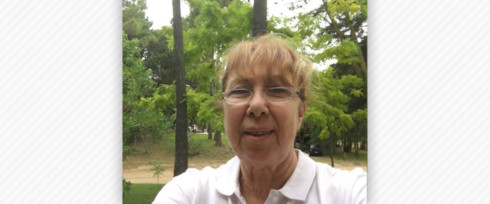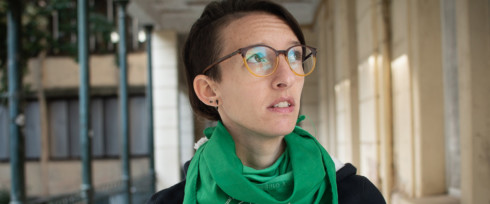Years of hard work by advocates, including Ipas, finally pay off
The tireless work of abortion rights advocates paid off on Dec. 30 when Argentina’s senate voted to legalize abortion—an historic shift after the senate rejected a similar bill just two years ago.
The bill makes abortion legal under all circumstances through 14 weeks of pregnancy, with exceptions after that point for rape and a pregnant person’s health. And abortion will be available free of charge in public hospitals. Until now, abortion was only legal in Argentina in cases of rape and risk to a woman’s health or life.
“This momentous vote in Argentina is a victory for women’s rights, for justice and for equality—and will have an immediate impact for people across Argentina,” says Anu Kumar, Ipas president and CEO. “We’re so proud to partner with some of the dedicated organizations and advocates who helped make this possible.”
Ipas has been supporting key partners and advocates for years in their work to build policymakers’ support for legal, accessible abortion in Argentina. Abortion rights advocates here and across Latin America have worn green handkerchiefs, becoming known as the “green wave” washing across the region—and showing the power of collective activism to build a more just world for all.
“Argentina’s Green Wave has energized all of Latin America,” says Maria Antonieta Alcalde, director of Ipas Central America and Mexico. “This victory to advance women’s right to make their own reproductive choices in Argentina is being celebrated all over our region. We are convinced this will have an impact beyond Argentina’s borders for the region-wide movement for legal, accessible abortion.”
Years of hard work pay off
Argentine activists worked strategically for years, organizing street marches and campaigns to build public support for abortion rights. Various organizations, including Ipas and many partners, also worked behind the scenes to strengthen the case for law change and help build the movement for abortion rights.
Mariana Romero, director of Ipas’s partner CEDES (Centro de Estudios de Estado y Sociedad / Center for State and Society Studies), says the new law “is the result of a constant and sustained effort by the women’s movement, which strengthened the social debate about abortion rights, took it to the streets and expanded it to different sectors.” Romero testified before both houses of congress during their debates leading up to the historic vote in 2020—and also during the debate of the 2018 bill that failed to pass. “Professional, academic and social organizations worked together in a very committed way,” she says.
‘A great victory’
Researcher, physician and activist Mariana Romero on Argentina’s historic vote to legalize abortion. Read the Q&A

For its part, Ipas collaborated with partners to build evidence on the quality and accessibility of existing abortion care, to train abortion providers and to support them in becoming advocates for legalization.
Ipas worked with CEDES and others to research and document barriers to abortion provision—particularly how conscientious objection is used to deny women access to care. A resulting 2018 publication, Re-thinking the Use of Conscientious Objection by Health Professionals, shared key findings and proposed language to regulate conscientious objection in a future bill to legalize abortion in Argentina. Several key suggestions from this proposal were included in the 2020 bill. And one finding—that providers often claim conscientious objection due to stigma and lack of knowledge about legal abortion—was cited frequently during the legislative debates about the new law. Findings from this work will now help ensure the law is implemented in a way that reduces the harms of conscientious objection to abortion seekers.
Ipas also has collaborated with local health authorities to train abortion providers and strengthen abortion care in public health facilities. These trainings connected abortion providers from across Argentina and the broader Latin America region, bringing many the solidarity and support needed to speak out in favor of safe, legal abortion.
In a “Doctors for decriminalization” video campaign organized by Ipas partner REDAAS (Red de Accesso al Aborto Seguro / Network for Safe Abortion Access), for example, doctors Graciela Lukin and Maria Paula Botta spoke out (see their profiles below); both had previously participated in Ipas trainings on comprehensive abortion care. And Daniel Teppaz, a doctor and former head of reproductive health for the city of Rosario, presented to the senate during its debate of the new abortion law; he previously worked with Ipas to strengthen abortion service delivery in his city.
When a similar bill was being debated in Argentina’s legislature in 2018, Ipas supported leaders from elsewhere in Latin America so they could present in person to Argentine legislators about their experiences establishing safe, legal abortion care in their countries. “This is the kind of years-long strategic work required to make historic law change possible,” says Karen Padilla, Ipas senior program manager for Latin America.
Expanding abortion access under the new law
Moving forward, Ipas will continue collaborating with partners to expand access to high-quality abortion care in Argentina. Using our “sustainable abortion ecosystem” approach, we’ll help build upon existing services and ensure:
- ongoing training of providers
- support to facilities
- systems to collect and use data to improve quality of care
- strong standards and guidelines that reduce barriers to care
- availability of needed supplies
- support to reproductive rights defenders
- information on how to access safe abortion is shared widely
“Ipas has extensive experience helping expand abortion services and access in settings around the world,” Padilla says. “We’re proud to now contribute to the implementation of these services in Argentina—and proud that Argentine women will have access to safe abortion.”
For more information, contact [email protected]




